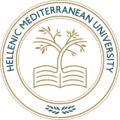
Maria Psillaki
Professor of Banking and Finance
Senior Visiting Research Fellow
The Postgraduate Study Programme MSc in Data Analytics and Financial Technology is a joint Inter-university Degree Study Programme between the Department of Administrative Science and Technology and Department of Accounting and Finance of the Hellenic Mediterranean University (GR) and the Department of Accounting and Finance and Department of Computer Science of Neapolis University Pafos. It leads to a joint Master’s Degree of Studies of the two Higher Education Institutions without requiring a recognition process by D.O.A.T.A.P. The programme is aimed primarily at graduates of Finance, Accounting, Economics, Business Administration and Computer Science.

Joint Inter-university Master’s Programme of Neapolis University Pafos and the Hellenic Mediterranean University (no submission required for recognition by D.O.A.T.A.P.)
The Inter-institutional Postgraduate Study Programme (I.P.S.P.) in “Data Analysis and Financial Technology” aims to develop a high level of research and educate graduates in the field of finance and computer science at the postgraduate level through the ten courses offered.
The purpose of the Programme is to arm the student with a very wide theoretical and practical arsenal of knowledge and analytical skills so that he/she can comprehend and develop the subject of data analysis and financial technology. The aim is also to educate students appropriately so that they develop critical thinking with the ultimate objective of producing research in the subject matter.
The proposed postgraduate programme in Data Analysis and Financial Technology responds to the specialised needs created by modern and classical methods of financing and managing capital resources of corporate organisations, modern financial instruments, banking needs and methods, and public involvement for raising and offering resources. With the specialised knowledge and skills that will be acquired from this programme, the graduates will be able on the one hand to apply the new methods and knowledge in these subjects in the world of businesses and organisations, and on the other hand they will have acquired the necessary specialisation background to advance their research to a higher level such as that of the doctorate.
In particular, the proposed I.P.S.P. aims to:
The above is a result of market globalisation but also the development of technology and computer science, the growth of data that offer, among other things, sources such as the World Wide Web, social networks, and the recent trend for open data. As an industry, FinTech refers to emerging technology companies aiming to compete with traditional financial institutions and offering a range of services, from mobile phone payment solutions, crowdfunding platforms or online micro-finance, to online portfolio management tools and international capital transfers. FinTech companies are attracting the interest of both the various users of banking services, as well as investment companies, who see them as the future of the finance sector.
Therefore, the role of Data Analysis and Financial Technology, which requires excellent knowledge of modern theories and practices of Computer Science and Finance combined with the concept of Big Data, highlight new opportunities for economic growth, elements that are considered particularly important today.
Holders of the Postgraduate Specialisation Diploma (PSD) in “Data Analysis and Financial Technology” from the proposed I.P.S.P. will have sufficient knowledge to pursue an international career, taking up positions with a particularly high level of knowledge in the organisation and management of the modern financial environment.
The teaching method used in the programme is a combination of lectures and interactive teaching methods. More specifically, the teaching method in the programme is participatory and interactive, so that students can develop their interpersonal skills through their active participation in the learning process. Learning activities and teaching methods include lectures, simulation games, discussion and debates, problem solving, group work, case studies. Students will present case studies in groups where their ability to support their views will be assessed. The exercises aim at the deeper understanding of the concepts developed during the lecture and better preparation for the exams. In addition, an educational film has been included that deals with a relevant issue for the purpose of critical discussion and argumentation by students in groups. Finally, they include a panel form of discussion with a coordinator where recent research articles will be discussed.
Teaching is based on distance learning and takes place in an online environment. The capabilities and techniques provided by ICT and asynchronous means of communication are exploited.
Teaching is based on academics’ and students’ interactivity and active involvement in the learning process, utilising multimedia material that will be tailored to the particular needs of distance learners.
In order to better understand the concepts and serve the educational teaching, the students are divided into groups. A total of six [6] teleconferences will take place, of which only the first will be the same date for all groups. Teleconferences are recorded giving each student the opportunity to repeat them often as he or she wishes.
Scheduled Online Educational Activities and Teaching Methods
To acquire a theoretical background and specialised knowledge so as to be able to explain the structural and constituent elements that compose the operation of the financial markets of investment service companies, investment funds, hedge funds or insurance companies.
Upon the successful completion of the programme students will be able to:
Academic year (3 academic semesters) The Master programme will be offered full-time and the programme’s normal duration is 1½ years (18 months). Master students must complete 90 ECTS to fulfil the degree requirements. The first-year core programme consists of eight integrated thirteen-week modules, totaling 60 ECTS. Master students must also complete a 30 ECTS Dissertation to fulfil the degree requirements. The programme will be delivered within three (3) academic semesters. During the 1st semester, a student has to take four (4) compulsory modules, totaling 30 ECTS and during the 2nd semester another three (3) compulsory modules will be provided and one (1) elective out of three (3), totaling 30 ECTS. After completing their first year in the Master programme (60 ECTS), students shall take a compulsory Master Dissertation, corresponding to 30 ECTS.
Furthermore, in accordance with the relevant announcements made by the Agency of Quality Assurance and Accreditation in Higher Education, students have the opportunity to complete their postgraduate studies in two academic semesters (12 months) as long as they start their Master’s Dissertation during the first or second semester of their studies, including the summer period. In this case, the completion of the Master’s Dissertation may be prolonged during the summer period, for one or two months. In any case, the total ECTS remain 90.
The assessment process is detailed in the Study Guide of each course. Each course is assessed individually, through assignments such as reports, interactive assignments (scientific article review, video review on current issues, quiz, simulation game) and formal written final exams or other alternative assessment methods.
It is noted that success in all the assessment pillars is a condition for the successful completion of the programme.
| Code | Accounting & Financial Management | Course type | ECTS |
|---|---|---|---|
| MBA550 | Accounting and Financial Statement Analysis | Compulsory | 7.5 |
| MFIN500 | Research and Quantitative Methods in Finance | Compulsory | 7.5 |
| DIS502 | Problem Solving Programming | Compulsory | 7.5 |
| MFIN560 | Banking Operations and Management | Compulsory | 7.5 |
| Code | Course title | Course type | ECTS |
|---|---|---|---|
| DAFT501 | Blockchain and Cryptocurrencies | Compulsory | 7.5 |
| DAFT502 | Modelling High Frequency Finance | Compulsory | 7.5 |
| DIS508 | Data Analytics | Compulsory | 7.5 |
| DIS507 | Disruptive Technologies | Elective | 7.5 |
| DAFT503 | Trading Strategies and Applications | Elective | 7.5 |
| Code | Course title | Course type | ECTS |
|---|---|---|---|
| MDIS600 | Dissertation | Compulsory | 30 |
The University admits students irrespective of nationality, race, religion, or gender, provided that they meet the predefined admission criteria of each Programme of study.
The University announces a call of interest for prospective students in daily newspapers, on the University’s webpage and in other webpages, as well as with any other appropriate means. Those who are interested may apply both electronically and by any other means (regular mail, application in the University’s secretariat, fax etc.).
To be admitted to the programme, all candidates must have completed an undergraduate programme at any accredited university or its equivalent. Documentation of the candidates’ education will be required as part of the application for admission.
The Postgraduate Programme takes into consideration the academic background of each candidate based on his/her previous studies, as well as his/her foreseen ability to conclude successfully the Programme. The programme is aimed primarily at graduates of Finance, Accounting, Economics, Business Administration and Computer Sciences. The necessary supporting documents to be submitted with the application include:
The minimum requirements for recognizing knowledge in the English language are described in detail in the study guide.
5.2. English language requirements
Satisfactory knowledge of English is essential. The minimum language requirement is a B2 certificate in the Common European Framework of Reference for Languages scale or any other equivalent degree. In the absence of such a certificate/degree, candidates will be asked to sit English language exams in order to prove their satisfactory knowledge.
The minimum English language requirements are:
One of the following other University of Cambridge ESOL exams:
After admission, candidates may be required to take additional instruction in English language.
The University reserves its right to define the electives offered on an academic year basis.
The programme structure may change without prior notice, as a result of quality assurance procedures or/and programme recertification.
Register your interest and one of our admissions consultants will contact you with guidance and additional information.